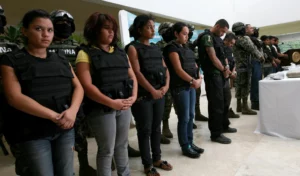In Latin America’s drug trade, a significant shift is underway: more women are stepping into leadership roles within drug cartels.
This change suggests a strengthening of these organizations, as reported by the Los Angeles Times.
Yadira Gálvez, a security expert at the National Autonomous University of Mexico, highlights this rise as a change in how women’s roles are perceived in drug trafficking.
Traditionally seen in minor roles or as victims, women are now engaging in violent activities like torture and murder, roles historically dominated by men.
However, This development, as reported by the international NGO Crisis Group, is strengthening the cartels’ presence and influence.

Journalist Deborah Bonello explains that many women join these groups seeking power, wealth, and the thrill of the criminal world.
Often, their entry into the criminal underworld is through personal relationships with men already involved in criminal activities.
Women in Organized Crime
These relationships enable cartel leaders to utilize women’s social and financial skills.
The Crisis Group emphasizes that women in organized crime take on diverse roles. In Mexico, for instance, women operate drones, leading to promotions in intelligence and leadership within their groups.
In addition, Women also head criminal groups involved in kidnappings, extortions, and human trafficking.
They oversee about 20 members, plan attacks, and enforce internal sanctions. These leadership roles come with constant availability, isolation from family, and betrayal risks.
The increasing involvement of women in organized crime has led to a rise in recruiting children, creating a cycle of intergenerational crime.
When imprisoned women lack adult caregivers, they recruit children for survival.The number of women imprisoned for crimes related to organized crime is increasing.
Women’s significant presence in criminal groups is driving the increase in crime rates in Mexico.
Colombia sees a surge in female drug trafficking prisoners. Gálvez emphasizes the need for adaptive security strategies in Latin America.
However, Overcoming stereotypes about women in crime is essential to effectively addressing this complex reality.
Enhancing intelligence capabilities is crucial to adapting to the changing dynamics of criminal organizations and their illegal activities.
In conclusion, identifying and dismantling these organizations is vital to reducing violence, requiring close international cooperation.

